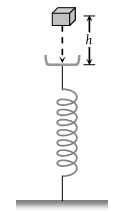The decrease in the potential energy of a ball of mass 20 kg which falls from a height of 50 cm is
(1) 968 J
(2) 98 J
(3) 1980 J
(4) None of these
A 0.5 kg ball is thrown up with an initial speed 14 m/s and reaches a maximum height of 8.0m. How much energy is dissipated by air drag acting on the ball during the ascent
(1) 19.6 Joule
(2) 4.9 Joule
(3) 10 Joule
(4) 9.8 Joule
An ice cream has a marked value of 700 kcal. How many kilowatt- hour of energy will it deliver to the body as it is digested
(1) 0.81 kWh
(2) 0.90 kWh
(3) 1.11 kWh
(4) 0.71 kWh
A running man has half the kinetic energy of that of a boy of half of his mass. The man speeds up by \(1~\text{m/s}\) so as to have same K.E. as that of the boy. The original speed of the man will be:
1. \(\sqrt{2}~\text{m/s}\)
2. \((\sqrt{2}-1)~\text{m/s}\)
3. \(\dfrac{1}{(\sqrt{2}-1)}~\text{m/s}\)
4. \(\dfrac{1}{\sqrt{2}}~\text{m/s}\)
A particle of mass m at rest is acted upon by a force F for a time t. Its Kinetic energy after an interval t is
(1)
(2)
(3)
(4)
Two bodies of masses m and 4 m are moving with equal K.E. The ratio of their linear momentums is
(1) 4 : 1
(2) 1 : 1
(3) 1 : 2
(4) 1 : 4
A particle of mass m1 is moving with a velocity v1 and another particle of mass m2 is moving with a velocity v2. Both of them have the same momentum but their different kinetic energies are E1 and E2 respectively. If m1 > m2 then
(1) E1 < E2
(2)
(3) E1 > E2
(4) E1 = E2
Four particles are given, having same momentum. Which one has maximum kinetic energy-
(1) Proton
(2) Electron
(3) Deutron
(4) α-particles
A block of mass m initially at rest is dropped from a height h on to a spring of force constant k. The maximum compression in the spring is x then-

(1)
(2)
(3)
(4)
A spherical ball of mass \(20\) kg is stationary at the top of a hill of height\(100\) m. It slides down a smooth surface to the ground, then climbs up another hill of height \(30\) m and finally slides down to a horizontal base at a height of \(20\) m above the ground. The velocity attained by the ball is:
1. \(10 \) m/s
2. \(10 \sqrt{30} \) m/s
3. \(40 \) m/s
4. \(20 \) m/s






